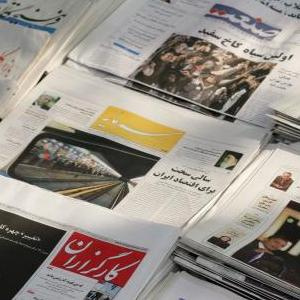Tehran's Daily Newspaper Review

The general guidelines on employment policies, developed by the Expediency Council and approved and issued by the Supreme Leader were Iran's top headline today. According to “experts” talking to the newspaper, “the three powers are responsible to advance the national employment movement”, not just the government. “The Iranian nation can change the global equations” President Ahmadinejad said in a ceremony held to unveil a book on occupation of Iran by the Allied Forces during the Second World War. Low-quality Chinese commodities, hated and bought by the Iranians at the same time, will be banned from entering the country in four months, according to the head of the National Standard Institute of Iran.
Jomhouri-ye Eslami’s top headline was Ayatollah Khamenei’s advice to the cultural apparatus. Leader of the Revolution called for setting off new initiative to promote book-reading among the Iranian population. In Qom, a respected cleric, Ayatollah Javadi Amoli criticized the “Iranian School” doctrine –a brainchild of Esfandiar Rahim Mashaei- or the “Iranian Republic” –Green demonstrators’ slogan during the 2009 Quds Day march- saying that Iranians did not die give their lives for these ideas. The daily’s editorial was on Shi’as responsibility during the absence of their 12th Imam, Mahdi (AS), and the uprising in the Arab World.
“The current circulation of books is not appropriate for a country of 75 million population” said Ayatollah Khamenei in his meeting with library directors from across the country. the Iranian Supreme Leader added that no advanced cultural instrument can replace books. He also rejected an open policy for the book market, stating that “harmful” books should not enter the society. Kayhan also reported of a “tsunami in Murdoch’s empire following the death of a witness”, namely Sean Hoare. In a speech, Heydar Moslehi, minister of intelligence, stated that “overemphasizing secondary issues and ignoring major concerns is the enemy’s plan.” Kayhan’s editorial, “De-ABSing culture” pertained to the West’s “Cultural Raid” against the Islamic Republic and its manifestation in the social life of the Iranians, particularly the recent wave of violent crimes. The author accused Iran's “enemies” of taking away the moral “anti-blocking braking system” of Iranians while calling for immediate action from Iranian cultural policy-makers.
“A major economic current is behind the narcotics’ trade” said Mahmoud Ahmadinejad in Yuri Fedotov, Executive Director of UN Office on Drugs and Crime. Resalat also quoted Ayatollah Mahdavi Kani, Head of the Assembly of Experts and conservatives’ spiritual leader, who called for avoiding equivocal remarks and stances which please the enemy. Like Kayhan, Resalat’s editorial, “Cultural Standby” written by former Minister of Education Mahmoud Farshidi, concerned the present cultural state of the society, criticizing cultural policy-makers of lethargy.
Shargh’s top headline was consideration of a bill which paves the way for closer supervision of the state-run TV. This is the first time in 30 years that the law is reviewed. The new bill suggests a board of trustees with members representing the three powers, Expediency Council and Assembly of Experts. Shargh’s editorial was written by Mohammad Hashemi, brother of Akbar Hashemi Rafsanjani, and former head of the state-run TV. Hashemi supported close monitoring of Seda-va-Sima’s record, while supporting establishment of private channels –banned according to the law.
Tehran-e Emrooz selected a different part of Ayatollah Mahdavi Kani’s remarks, a remembrance from the first president of the Islamic Republic, Abolhasan Banisadr, whom Ahmadinejad is frequently compared to. “President said I don’t recognize the law, Emam [Khomeini] said the law does not recognize you” recalled Mahdavi Kani, sugarcoating a warning to Ahmadinejad to avoid a fate similar to Banisadr’s (impeachment by the parliament and self-exile.) “Unprecedented demand for a share from the National Development Fund” referred to governmental organizations to receive an aggregate of 37 billion dollars from a fund with a 20 billion dollar reserve. Tehran-e Emrooz’ editorial accounted anti-Iranian diplomacy of the United States after the 1979 Islamic Revolution and its changing strategies and tactics and its connection to regional states’ attitude towards Iran.
* Note: Vatan-e Emrooz does not publish on Thursdays.
Trouble with understanding some terms? Check our Glossary of Iranian Political Terms.
Briefing
Hamshahri (Citizen) is the official daily newspaper of Tehran's Municipality. Its general directions in politics, culture and economy are determined by the mayor of Tehran, currently Mohammad Baqer Qalibaf.
Iran is the official organ of the administration.
Jomhouri-ye Eslami (The Islamic Republic) was known as the official organ of the Party of the Islamic Republic, founded in 1979 and disbanded in 1987. Currently, it is an open critique of Mahmoud Ahmadinejad's policies and is known to be a mouthpiece of Akbar Hashemi Rafsanjani.
Kayhan (Universe) is a hard-line conservative newspaper. Its editor-in-chief –currently Hossein Shari’atmadari- is appointed by Iran's Supreme Leader. Shari’atmadari’s editorials often spark off controversy and debate inside Iranian political circles.
Khabar (News) is a principlist daily newspaper which adopts a critical stance towards Ahmadinejad's policies.
Resalat (Mission) belongs to the moderate wing of the principlist camp. Resalat’s best known analyst is Amir Mohebbian, its political editor.
Shargh (East) is a moderate reformist newspaper. It was the most popular and influential reformist newspaper in its first period of publication which lasted from August 2003 until September 2006.
Tehran-e Emrooz (Tehran Today) is a ‘principlist reformist’ newspaper, connected to Mohammad Baqer Qalibaf.

